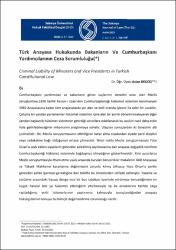Türk Anayasa Hukukunda Bakanların ve Cumhurbaşkanı Yardımcılarının Ceza Sorumluluğu
Künye
DELİCE, Aslan. "Türk Anayasa Hukukunda Bakanların ve Cumhurbaşkanı Yardımcılarının Ceza Sorumluluğu". Sakarya Üniversitesi Hukuk Fakültesi Dergisi, 11.2 (2023): 768-795.Özet
Cumhurbaşkanı yardımcıları ve bakanların görev suçlarının denetim aracı olan Meclis soruşturması,1876 tarihli Kanun-ı Esasi’den Cumhurbaşkanlığı hükümet sistemini benimseyen 1982 Anayasasına kadar tüm anayasalarda yer alan ve belli oranda işlevini ifa eden bir usuldür. Çalışma bir yandan parlamenter hükümet sistemini içine alan bir asırlık dönemi inceleyerek diğer yandan başkanlık hükümet sisteminin getirdiği sorunlara odaklanarak bu usulün nasıl daha etkin hale getirilebileceğinin imkanlarını araştırmaya yönelir. Ulaşılan sonuçlardan iki tanesinin altı çizilmelidir; ilki, Meclis soruşturmasının etkinliğinin karar alma nisabından ziyade parti disiplini veya sadakatine bağlı olduğunun ortaya çıkmasıdır. İkinci nokta Meclis soruşturmasıyla Yüce Divan'a sevk edilen siyasilerin görevden azledilmiş sayılmalarına dair anayasa değişiklik teklifinin Cumhurbaşkanlığı hükümet sistemiyle bağdaşmaz olmadığının gösterilmesidir. Kimi yazarlarca Meclis soruşturmasıyla itham etme usulü arasında kurulan benzerlikler makalenin ABD Anayasası ve Yüksek Mahkeme kararlarına değinmesini zorunlu kılmış bilhassa Yüce Divan’a sevkin görevden azlide içermesi gerektiğine dair teklifte bu örneklerden istifade edilmiştir. Yasama ve yürütme arasındaki hassas denge ince bir buz tabakası üzerinde yürümeye benzediğinden en küçük hatalar bile ya hükümet etkinliğinin yitirilmesiyle ya da örneklerine tarihte sıkça rastladığımız yetki istismarlarının yaptırımsız kalmasıyla sonuçlandığından anayasa hukukçularının konuyu bu bilinçle değerlendirme zorunluluğu vardır. The parliamentary investigation, which is a means of oversight of the malfeasance of vice presidents and ministers, is a procedure that has been included in all Turkish Constitutions from Kanun-i Esasi, the first constitution of Ottomans, to the 1982 Constitution, which now adopts the presidential system of government, and has fulfilled its function to a certain extent. The study, by examining the events of a century of parliamentary system of government on the one hand and focusing on the problems brought by the presidential system on the other hand, investigates the possibilities of how this procedure can be made more effective. Two of the conclusions reached should be underlined; the first is that the effectiveness of the Parliamentary Investigation depends more on party discipline or loyalty than on the decision-making quorum. The second point is that the proposed constitutional amendment foreseeing the politicians referred to the Supreme Criminal Tribunal through a parliamentary investigation to be dismissed from office is not incompatible with the presidential system. The similarities established by some authors between the Parliamentary investigation and the impeachment procedure made it necessary for the article to refer to the US Constitution and Supreme Court decisions, and these examples were utilized, especially in the proposal that referral to the Supreme Criminal Tribunal should include dismissal from office. Since the delicate balance between the legislature and the executive is akin to walking on a thin sheet of ice, and since even the smallest mistakes result in either the loss of government effectiveness or the lack of sanctions for abuses of power that we have frequently seen in history, constitutional lawyers must evaluate the issue with this awareness.



















